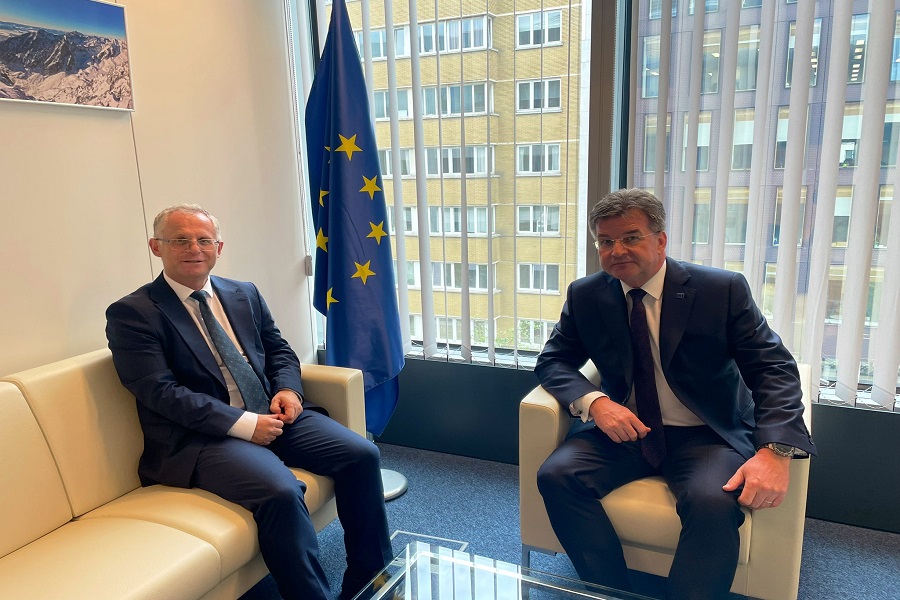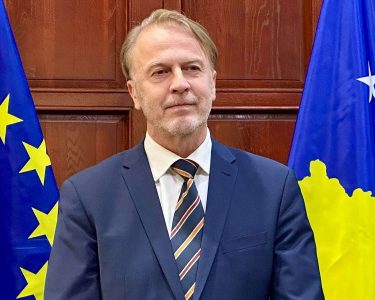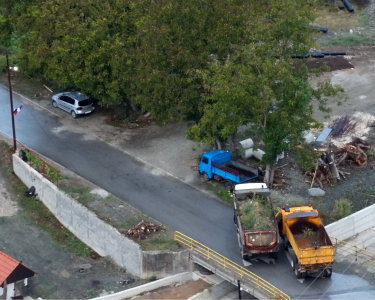The Deputy Prime Minister Besnik Bislimi has written a letter to the EU Special Representative for the Kosovo-Serbia dialogue, Miroslav Lajcak, listing the efforts that Kosovo has made in terms of requests for the lifting of the measures.
Bislimi has asked Lajcak, together with High Representative Borrell, to make an urgent and formal request for the removal of these measures, which are negatively affecting the progress and reforms of Kosovo in the EU.
Dear EUSR Lajcak,
I am writing to list the efforts that Kosovo has made towards the requirements for measures to be lifted, and I entreat You and HRVP to place an urgent and formal request to this effect.
The measures against Kosovo were adopted by the EEAS and DGNEAR when the widespread narrative blamed Kosovo for the escalation in the four northern municipalities in June 2023. These measures clearly incentivized Serbia towards radicalization as it abducted three policemen from inside Kosovo’s territory soon after. A few months later, Serbia sponsored the act of aggression and terrorist attack in Banjska with the clear aim for wider destabilization.
In the meantime, Kosovo has implemented all elements included in the Bratislava Arrangements, agreed on 10 July 2023. We have now reached an irrational situation where Kosovo is defending the rule of law while under measures while Serbia continues to fuel radicalism without repercussions. It is self-evident that this unfair singling out of Kosovo also harms the process of normalization with Serbia facing disincentives to formalize and implement the agreement as negotiated.
The measures adversely affect our EU progress and reforms. Allow me to remind you that Kosovo is a regional leader in its desire to join the EU with the highest level of support among citizens and the whole political spectrum. The impasse in the execution of IPA projects harms our efforts for accelerated growth, EU convergence and essential strategic reforms. An immediate removal of these negative measures would not only help us mobilize efforts for accelerated reform progress, but at the same time create the conducive environment for strengthened regional cooperation and faster integration of WB6.
One of the main priorities of the Government Programme 2021-2024 is the integration of all communities in the Kosovo society, the goal of which is to support integration of the Kosovo Serb community and other communities through measures that stimulate their participation in the institutional, economic and social life. This priority is in line with EU values and “fundamentals first”, which prioritizes stable institutions guaranteeing democracy, rule of law, human rights and respect for and protection of minorities, as well as a functioning market economy compatible with EU standards.
Annex
List of proactive measures undertaken to improve the participation of Serbs in Kosovo’s institutions and public life
1. Creation of the mechanism for the verification of diplomas issued by high schools in the Serbian system in Kosovo. By decision of the government meeting in October, the legal basis has been created for the verification of diplomas issued by high schools in the Serbian system in Kosovo. This unilateral measure reverberates an opportunity that was not even discussed in the normalization Dialogue. This offers huge new opportunities for an estimated 30.000 holders of such diplomas to access higher education or employment in Kosovo’s institutions and labor market, and ensure a workforce reflecting Kosovo’s diversity. New funding arrangements were ensured and the Secretariat at the Ministry of Education was enlarged alongside detailed regulations. Serbia has not reciprocated against this measure yet. The commission has met a total of 21 times (11 times since 13 June 2023) and verified 75 diplomas since June. An office in the municipality of North Mitrovica serves as a collection point for diplomas to be submitted in order to make the process easier without the need to travel to Prishtina. This should soon become available also in Gracanica and Ranilug.
2. International Business College Mitrovica has been transformed into a Public College of Higher Education. For the International Business College Mitrovica (27% of students from communities who study in English in north and south of Mitrovica) the government has allocated 270.000 euros. This presents a major opportunity for students willing to study in a public, subsidized higher education institutions offering programs in Serbian language.
3. Additional Subsidies for 4 municipalities in the North of Kosovo. Kosovo is also doing its best to bring the various subsidy schemes close to members of the Serb community and devise new schemes to improve the economic outlook. Subsidies worth three million euros were allocated in the second half of 2023 by the Ministry for Communities and Returns for 265 grants to NGOs, farmers and small businesses from non-majority communities. The majority of these funds (55% of funds for businesses; 66% of funds for farmers) went to the Serbian community in Kosovo and all communities benefited. Several ministers have visited farmers, media and entrepreneurs as well as sites for potential infrastructure projects. In 2023, the Government has allocated 5.8 million Euros to infrastructure projects in the four northern municipalities. One million euros allocated by the Ministry of Local Government Administration for municipalities for infrastructure projects in areas with non- majority communities. The Ministry of Communities and Returns awarded grants to 42 individuals and organisations for minority community projects in education, culture, sport, health and religious celebrations. The Government has allocated 2 million euros for the building of houses for members of non-majority communities and 1 million euro for renovations for the homes of members of communities.
4. Restoration of damages caused to the Banjska Monastery during Serbia’s Act of Aggression. The Ministry of Culture, Youth and Sports has offered to restore damages caused to the Banjska Monastery which was damaged during the assault by the terrorist group in September. To note, final analysis of the grants given by the Ministry of Culture, Youth and Sports showed that in 2023 their financial support to communities was doubled. Through open calls, 88 non-majority community projects were supported, totaling over 400.000 euro, including publishing 10 books in community languages.
5. Adoption of the Strategy for the Protection of Rights and Interests of Communities in Public Administration. The Government has approved the Strategy for the Protection of Rights and Interests of Communities in Public Administration, passed in December 2023, which has an accompanying action plan. Following the Law on Public Officials and its accompanying Regulation passed by the government in October 2023 which specifies that recruitment procedures can be restricted to non-majority communities as an affirmative measure to secure the 10% quota of members of communities employed in central institutions, each ministry will identify 10 positions to be advertised only to members of non-majority communities in February. Constitutional provisions for representation across the administration requires over-representation of communities in the public sector.
6. Regular dialogue with the Serb community. The Prime Minister and Deputy Prime Ministers have engaged in regular dialogue with the Serb community, including Serb media. Depending on the topic, meetings involved appropriate line ministers and diverse representatives of the Serb community. Under pressure from Belgrade towards civil society representatives, most meetings are conducted confidentially. Every four months, the Prime Minister has regularly met Municipal Officers for Communities and Returns. Prime Minister’s regular video messages in Serbian has enabled Serbian-speaking citizens to hear directly from him on mainstream and social media, rather than messages being distorted by inaccurate reporting and translation.
7. The vacant position of the Director of the Office for Community Affairs has been advertised. This position is open only to members of non-majority communities, and the process is observed by the Merit-Based Recruitment project of the British Embassy to secure maximum confidence in the results.
8. Substantial increase in the budget and grants for NGOs working on securing implementation of the Law on the Use of Languages. Additional jobs are to open in the newly-created Office of Language Control and Harmonisation within the Prime Minister’s Office which will increase the number of Serbian translators in 2024 and secure the rule of law with accurate versions of laws and sub-legal acts. Personal intervention by the Prime Minister resolved the issue with the absence of Serbian translation of plenary sessions in the Assembly. For the first time, press releases by the Office of the Prime Minister are publicized in both official languages and government meetings are streamed live also Serbian. Web-sites of several institutes were reviewed and are now offered in both languages, now fully compliant with the Law on the Use of Languages. Additional efforts were made to improve participation of communities in sports, culture, and overall with various information campaigns, including the visa liberalisation information campaign.
9. Rapid rise in applications of Kosovo Serbs for Kosova passports. In light of the visa liberalization and outreach by the institutions, there was a rapid rise in applications of Kosovo Serbs for Kosova passports-e.g. over 5800 in the four northern municipalities, demonstrating the interest in and benefits of integration for the Serbian community.
10. Kosovo Integration Fund. Government of Kosovo aims to establish a new Kosovo-EU program called “Kosovo Integration Fund” with the goal to promote integration and improve the living standards of local communities in the Kosovo Serb majority municipalities through provision of various practical institutional, economic and social opportunities for cooperation between municipalities with different ethnic composition. There are three main objectives of the Kosovo Integration Fund for Kosovo Serb-majority municipalities: 1. Strengthening local governance development and services through inter- municipal cooperation projects to improve service delivery. 2. Inter-municipal Private Sector Support aims to improve generation of employment for women and youth through the support of start-up businesses, innovation hubs, learning programs, vocational education training, online service, technology advancement, etc. Favourable policies and legislation at the central level are to incentivize investments in Kosovo Serb majority municipalities and generation of export-led businesses. 3. Engagement of citizens in public life is to strengthen through civil society to support citizen initiatives, NGOs in a wide- range of activities, and mobility and people-to-people exchange. The Government of the Republic of Kosovo commits to contribute more than half of the 100 million EUR target towards this Fund, which are to be channeled through budget support to municipalities, direct investments for infrastructure, loans and technical assistance to businesses, grants to NGOs, start-ups and citizen initiatives, scholarship for students as well as technical assistance and capacity-buildings for regional programs.








